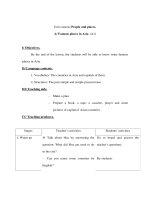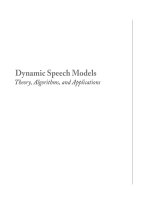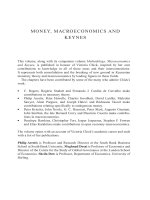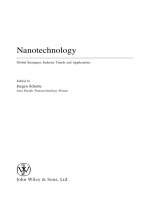GLOBALIZATION AND EDUCATION phần 1 pot
Bạn đang xem bản rút gọn của tài liệu. Xem và tải ngay bản đầy đủ của tài liệu tại đây (2.87 MB, 32 trang )
Globalization and Education
PAS
E
XTRA
S
ERIES
28
PASS
E
CTRA
S
ERIES
7
VATICAN CITY
2006
MMVI
Globalization
and Education
THE PONTIFICAL
ACADEMY OF
SCIENCES
Extra Series 28
THE PONTIFICAL
ACADEMY OF
SOCIAL SCIENCES
Extra Series 7
In today’s complex situation, not least because
of the growth of a globalized economy, the Church’s
social doctrine has become a set of fundamental
guidelines offering approaches that are valid even
beyond the confines of the Church: in the face of
ongoing development these guidelines need to be
addressed in the context of dialogue with all those
seriously concerned for humanity and for the world
in which we live On the other hand – and here we
see one of the challenging yet also positive sides of
the process of globalization – we now have at our
disposal numerous means for offering humanitar-
ian assistance to our brothers and sisters in need,
not least modern systems of distributing food and
clothing, and of providing housing and care.
Concern for our neighbour transcends the confines
of national communities and has increasingly
broadened its horizon to the whole world. The
Second Vatican Council rightly observed that
‘among the signs of our times, one particularly wor-
thy of note is a growing, inescapable sense of soli-
darity between all peoples’. State agencies and
humanitarian associations work to promote this,
the former mainly through subsidies or tax relief,
the latter by making available considerable
resources. The solidarity shown by civil society thus
significantly surpasses that shown by individuals.
Encyclical Letter
Deus Caritas Est of the Supreme
Pontiff Benedict XVI to the Bishops, Priests and
Deacons, Men and Women Religious, and all the
Lay Faithful on Christian Love (25 December 2005).
Joint Working Group
16-17 November 2005
Cover.qxd:00_Cover.qxd 12-12-2006 16:37 Pagina 1
GLOBALIZATION
AND EDUCATION
Address
The Pontifical Academy of Sciences and of Social Sciences
Casina Pio IV, 00120 Vatican City
Tel: +39 0669883195; +39 0669881441 – Fax: +39 0669885218
E-mail: ;
THE PONTIFICAL ACADEMY OF SCIENCES
Extra Series 28
THE PONTIFICAL ACADEMY OF SOCIAL SCIENCES
Extra Series 7
GLOBALIZATION
AND EDUCATION
the
PROCEEDINGS
of a
Joint Working Group
16-17 November 2005
Casina Pio IV
VATICAN CITY 2006
The opinions expressed with absolute freedom during the presentation of the
papers of this meeting, although published by the Academies, represent only
the points of view of the participants and not those of the Academies.
Editors of the Proceedings:
Marcelo Sánchez Sorondo
Edmond Malinvaud
Pierre Léna
ISBN 88-86761-089-1
© Copyright 2006
THE PONTIFICAL ACADEMY OF SCIENCES
THE PONTIFICAL ACADEMY OF SOCIAL SCIENCES
VATICAN CITY
Pope Benedict XVI
The Pontifical Academy of Sciences, Casina Pio IV
Some Participants at the Joint Working Group, 16 November 2005
Message of His Holiness Benedict XVI
CONTENTS
Preface
Programme
List of Participants
The Synthesizing Mind: Making Sense of the Deluge of Information
Howard E. Gardner
The $100 Laptop
Nicholas Negroponte
Globalisation and Education – An Overview
M. Govind Kumar Menon
The Grand Narrative Told by the Sciences
Michel Serres
News, Global Communication Technologies and Education
Mortimer Zuckerman
No One Left Behind Technology and lifelong mass learning
Rajendra S. Pawar, Manas Chakrabarti and Sugata Mitra
Education in a Globalized World
David E. Bloom
Promoting South-South and North-South Cooperation in Education
and Research: A Question of Responsibility
Mohamed H.A. Hassan
XI
XIII
XVII
3
19
24
39
43
51
59
79
NEW APPROACHES TO EDUCATION IN THE GLOBALIZED WORLD
THE ROLE OF COMMUNICATION AND INFORMATION TECHNOLOGIES
THE EFFECTS OF GLOBALIZATION ON EDUCATION
Globalization, Immigration, and Education: Recent US Trends
Marcelo M. Suárez-Orozco, Carola Suárez-Orozco
What Can We Do to Improve the Education of Children From Disad-
vantaged Backgrounds?
Louis-André Vallet
Globalization and Cultural Identity
Wei Yu
Globalization and Challenges for Education in Least Developed Countries
Jean-Claude Berthélemy
Cultural Diversity and Education in an Increasingly Globalizing
World (From the perspective of a ‘Developing Country’)
Mina M. Ramirez
The Challenge of International Educational Gaps in the Context of
Globalizations
Juan J. Llach
Brain and Education
Jean-Didier Vincent
Education Between Ethical Universality and Cultural Particularity
Jürgen Mittelstrass
Statement on Globalization and Education
Erklärung zu Globalisierung und Bildung
Déclaration sur Globalisation et éducation
Declaración sobre Globalización y Educación
Messaggio su Globalizzazione ed Educazione
Statement on Globalization and Education (Chinese Version)
Tables
C
ONTENTS
X
93
127
159
166
191
213
239
245
257
262
267
272
277
283
287
EDUCATION OF IMMIGRANTS AND THEIR CHILDREN
EDUCATION AND CULTURAL DIVERSITY
WHICH ANTHROPOLOGICAL BASES FOR EDUCATION AND RESEARCH?
PREFACE
The Pontifical Academy of Sciences and the Pontifical Academy of Social
Sciences are jointly sponsoring a workshop on ‘Globalization and Education’
which will take place November 16-17, 2005. The focus of the workshop will
be to find an educational project for an increasingly globalized world, based
on our current bioanthropologic knowledge of the human being within the
context of the diversity and interdependence of cultures, the interculturality
and universality of ethical values, the role of communication technologies and
the new migration patterns.
The goal of education is to prepare young people to live well with oth-
ers, knowledge being considered essential for this purpose. In every com-
munity, education has always been deeply rooted in culture, tradition and
in the ‘project on man’ carried out by this group. From these roots it will
derive its detailed and complex organization.
The issue of education implies an answer to the question: what can we
do to improve the life of the present and future generations? Today, after
globalization, we are aware that many aspects must change to improve the
well being of all: climate, health, the economy, the family, social environ-
ment, national and international institutions and the democratisation of
the mass media.
A globalized world and its driving forces are posing new challenges to edu-
cation for families, schools, universities, lifelong training. This first Workshop
shall focus on school education, which should transmit knowledge, enhance
justice, prepare the future and preserve the diversity of cultures.
***
Firstly, globalization will have to be defined in its most relevant aspects.
Secondly, its impact on education may be discussed along several broad
lines: respect and tolerance for others, based on knowledge; understanding
and preservation of cultural diversity, including languages; the economics
of education, especially in the developing world; the role of sciences and of
the social sciences as a knowledge of universal value; the place of religions;
the new tools for communication; the understanding and managing of the
planet; the mixing of populations through immigration.
The two-day Workshop will be organized with keynote speeches, fol-
lowed by presentations and a general discussion. To better focus the
Workshop, the sixteen speeches are organized along these six axes:
1. New approaches to education in the globalized world;
2. The role of communication and information technologies;
3. The effects of globalization on education;
4. Education of immigrants and their children;
5. Education and cultural diversity;
6. Anthropological bases for education and research.
The goal of the Workshop is to launch a first discussion on this vast pro-
gramme and reach a statement which could help inspire and derive global
models for education contents in the future.
Marcelo Sánchez Sorondo
Edmond Malinvaud
Pierre Léna
P
REFACE
XII
PROGRAMME
WEDNESDAY, 16 NOVEMBER
9:00 Word of Welcome
Prof. EDMOND MALINVAUD
and Prof. PIERRE J. LÉNA, Coordinators of the meeting
NEW APPROACHES TO EDUCATION IN THE GLOBALIZED WORLD
9:30 Chairperson: Prof. PIERRE J. LÉNA
Speaker: Prof. HOWARD E. GARDNER
The Synthesizing of Knowledge: An Imperative in a Global Society
Discussion
10:20 Coffee Break
10:50 Speaker: Prof. N
ICHOLAS NEGROPONTE
The $100 Laptop
Discussion
11:40 Speaker: Prof. M. G
OVIND KUMAR MENON
Globalization and Education: An Overview
Discussion
12:30 General Discussion chaired by Prof. Y
VES QUÉRÉ
13:00 Lunch at the Casina Pio IV
THE ROLE OF COMMUNICATION AND INFORMATION TECHNOLOGIES
14:30 Chairperson: Prof. ANTONIO M. BATTRO
Speaker: Prof. MICHEL SERRES
The Grand Narrative Told by the Sciences
Discussion
15:20 Speaker: Mr. MORTIMER ZUCKERMAN
News, Global Communication Technologies and Education
Discussion
16:10 Speaker: Prof. R
A
JENDRA
S. PA
WAR
No One Left Behind
Discussion
17:00 General Discussion chaired by Prof. A
NTONIO M. BATTRO
17:30 Coffee Break
THE EFFECTS OF GLOBALIZATION ON EDUCATION
18:00 Chairperson: Prof. EDMOND MALINVAUD
Speaker: Prof. David E. BLOOM
Education and Global Development
Discussion
18:50 Speaker: Prof. M
OHAMED H.A. HASSAN
Promoting South-South and North-South Cooperation
in Education and Research
Discussion
19:40 General Discussion chaired by Prof. K
EVIN RYAN
20:10 Dinner at the Casina Pio IV
T
HURSDAY, 17 NOVEMBER
EDUCATION OF IMMIGRANTS AND THEIR CHILDREN
9:00 Chairperson: Prof. MARGARET S. ARCHER
Speaker: Prof. MARCELO M. SUÁREZ-OROZCO
Moving Stories: The Education of Immigrant
and Refugee Children and Youth
Discussion
P
ROGRAMME
XIV
PROGRAMME
XV
9:50 Speaker: Prof. LOUIS-ANDRÉ VALLET
What Can We Do to Improve the Education
of Children from Disadvantaged Backgrounds?
Discussion
10:40 General Discussion chaired by Prof. M
A
RGARET
S. AR
CHER
11:10 Coffee Break
EDUCATION AND CULTURAL DIVERSITY
11:40 Chairperson: Prof. MARY ANN GLENDON
Speaker: Prof. WEI YU
Globalization and Cultural Identity
Discussion
12:30 Speaker: Prof. J
EAN-CLAUDE BERTHÉLEMY
Globalization and Challenges for Education
in Least Developed Countries
Discussion
13:20 Lunch at the Casina Pio IV
15:00 Speaker: Prof. M
INA M. RAMIREZ
Cultural Diversity
Discussion
15:50 Speaker: Prof. J
UAN JOSÉ LLACH
Global Education Gaps: Recent Trends, Obstacles and Policies
Discussion
16:40 General Discussion chaired by Prof. M
ARY ANN GLENDON
17:10 Coffee Break
WHICH ANTHROPOLOGICAL BASES FOR EDUCATION AND RESEARCH?
17:40 Chairperson: Prof. NICOLA CABIBBO
Speaker: Prof. JEAN-DIDIER VINCENT
What Is Our Bioanthropological Knowledge of the Human Being
Discussion
18:30 Speaker: Prof. JÜRGEN MITTELSTRASS
Education between Ethical Universality and Cultural Particularity
Discussion
19:20 General Discussion chaired by Prof. N
I
COLA
CA
BIBBO
19:50 Dinner at the Casina Pio IV
P
ROGRAMME
XVI
LIST OF PARTICIPANTS
Prof. NICOLA CABIBBO, President
H.E. Msgr. MARCELO SÁNCHEZ SORONDO, Chancellor
The Pontifical Academy of Sciences
Casina Pio IV
V-00120 Vatican City
Prof. M
ARGARET S. ARCHER
University of Warwick – Department of Sociology
Coventry, Warwickshire CV4 7AL (Great Britain)
Prof. A
NTONIO M. BATTRO
Battro & Denham Consultores
Billinghurst 2574 Piso 1 A
C1425DTZ Buenos Aires (Argentina)
Prof. J
EAN-CLAUDE BERTHÉLEMY
Université Paris 1
Panthéon-Sorbonne
TEAM/Maison des Sciences Economiques
106, boulevard de l’Hôpital
F-75013 Paris (France)
Prof. D
AVID E. BLOOM
Harvard University
School of Public Health
Department of Population and International Health
665 Huntington Avenue
Boston, MA 02115 (USA)
Msgr. FRANCESCO FOLLO, Permanent Observer
United Nations Organization for Education, Science and Culture (UNESCO)
10 Avenue du President Wilson
F-75116 Paris (France)
Prof. H
OWARD E. GARDNER
Harvard Graduate School of Education
201 Larsen Hall – 14 Appian Way
Cambridge, MA 02138 (USA)
Prof. M
ARY ANN GLENDON
Harvard University Law School
Hauser Hall 504
1575 Massachusetts Avenue
Cambridge, MA 02138 (USA)
Prof. M
OHAMED H.A. HASSAN, Executive Director
Third World Academy of Sciences
ICTP Enrico Fermi Building, Room 108
Strada Costiera 11
I-34014 Trieste (Italy)
Prof. R
AYMOND HIDE
17, Clinton Avenue
East Moseley, Surrey KT8 0HS (United Kingdom)
Prof. P
IERRE LÉNA
Université Paris VII Denis Diderot
Observatoire de Paris
Place Jules-Janssen
F-92195 Meudon (France)
Prof. J
UAN J. LLACH
Urquiza 875
B1638BWC V. López, Buenos Aires (Argentina)
L
IST OF PARTICIPANTS
XVIII
LIST OF PARTICIPANTS
XIX
Prof. EDMOND MALINVAUD
42, avenue de Saxe
F-75007 Paris (France)
Prof. M. G
O
VIND
KU
MAR
ME
NON
K-5 (Rear), Hauz Khas Enclave
New Delhi 110016 (India)
Msgr. J. M
ICHAEL MILLER, Secretary
Congregazione per l’Educazione Cattolica
V-00120 Vatican City
Prof. J
ÜRGEN MITTELSTRASS
Universität Konstanz
Fachbereich Philosophie und Zentrum Philosophie und Wissenschaftstheorie
D-78457 Konstanz (Federal Republic of Germany)
Prof. N
ICHOLAS NEGROPONTE
Massachusetts Institute of Technology
The Media Laboratory
E15-210
77 Massachusetts Avenue
Cambridge, MA 02139-4307 (USA)
Prof. R
AJENDRA S. PAWAR
Chairman, CII IT Committee & Chairman NIIT Limited
8, Balaji Estate
Sudarshan Munjal Marg, Kalkaji
New Delhi – 110 019 (India)
Prof. Y
VES QUÉRÉ
Académie des Sciences
Délégation aux Relations internationales
23, quai de Conti
F-75006 Paris (France)
Prof. MINA M. RAMIREZ
Asian Social Institite (ASI) Inc.
Graduate School of Social Transformative Praxis
1518 Leon Guinto, Malate
Manila 1004 (The Philippines)
Dr. C
ARLINA RINALDI
Reggio Children
Via Bligny, 1
I-42100 Reggio Emilia (Italy)
Prof. K
EVIN RYAN
Boston University
Center fo the Advancement of Ethics and Character
605 Commonweath Avenue
Boston, MA 02215 (USA)
Prof. M
ICHEL SERRES
128, rue de Montreuil
F-94300 Vincennes (France)
Prof. M
ARCELO M. SUÁREZ-OROZCO
New York University
The Stainhardt School of Education
246 Greene Street
New York, N.Y. 10003 (USA)
Prof. L
OUIS-ANDRÉ VALLET
Centre de Recherche en Économie et Statistique
Laboratoire de Sociologie Quantitative
Timbre J350
3, avenue Pierre Larousse
F-92245 Malakoff Cedex (France)
L
IST OF PARTICIPANTS
XX
LIST OF PARTICIPANTS
XXI
Prof. JEAN-DIDIER VINCENT
C.N.R.S.
Institut de Neurobiologie Alfred Fessard
1, avenue de la Terasse
F-91198 Gif-sur-Yvette (France)
Prof. YU WE
I
SouthEast University
Research Center for Learning Science
Si Pai Lou 2#
Nanjing (People’s Republic of China)
Rev. Msgr. A
NGELO V. ZANI, Under-Secretary
Congregazione per l’Educazione Cattolica
V-00120 Vatican City
Mr. M
ORTIMER ZUCKERMAN, Editor in Chief
U.S. News & World Report
1050 Thomas Jefferson Street, N.W.
Washington, DC 20007 (USA)
NEW APPROACHES TO EDUCATION
IN THE GLOBALIZED WORLD
MASTER GABRIELLA.qxd:01_Gardner(OK+Ale).qxd 12-12-2006 16:50 Pagina 1
MASTER GABRIELLA.qxd:01_Gardner(OK+Ale).qxd 12-12-2006 16:50 Pagina 2
THE SYNTHESIZING MIND: MAKING SENSE
OF THE DELUGE OF INFORMATION
*
HOWARD E. GARDNER
a) FROM THE BEGINNING: SYNTHESIS
It is surely no accident that the story of human beings began when
Adam was enticed to take a first bite of the fruit from the tree at the center
of the Garden of Eden – the Tree of Knowledge. ‘Knowing Creatures’ is as
good a description of our species as any. Our knowledge begins with infor-
mation present at birth, as a result of our species membership and any con-
genital conditions that may obtain. In the early months of life, knowledge
grows out of our actions upon the world and information assimilated
through our several sensory organs (Piaget 1983). But as early as the sec-
ond six months of life, our knowledge is already being augmented by what
we learn from others, through what they do, what they show us, and what
they tell us. In pre-historical times, the total sum of knowledge may well
have been limited; and what was known by one generation was only bare-
ly exceeded by the following generation. Even ancient Egypt changed at
glacial speed. But once writing had been invented, knowledge began to
accumulate at rates that threaten to overwhelm even the most capacious
human brains.
Opening our eyes and our minds to knowledge is one thing – making
sense of and ordering that knowledge entails a good deal more. The Bible –
as well as similar books outside the Judaeo-Christian tradition – represent-
ed an early attempt to present and synthesize knowledge about how to live.
The Golden Rule and the Ten Commandments are crucial: they represent
efforts to distill innumerable examples to their actionable essence. Once
societies began to become self-conscious about the knowledge that had
accumulated, individuals and groups attempted to set down that knowl-
edge in ways that were systematic and that facilitated assimilation by the
*
Copyright Howard Gardner 2006.
MASTER GABRIELLA.qxd:01_Gardner(OK+Ale).qxd 12-12-2006 16:50 Pagina 3









